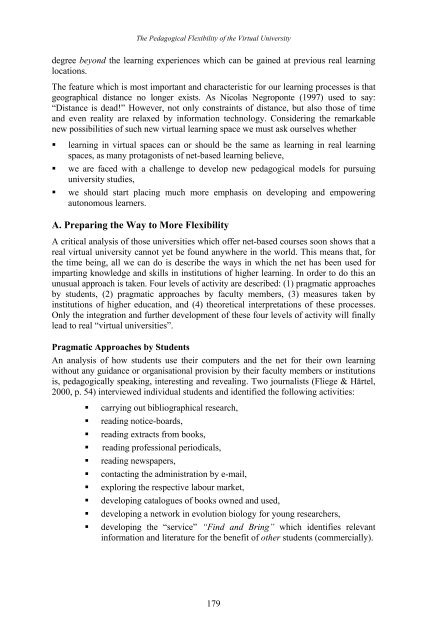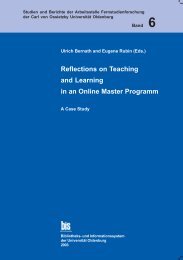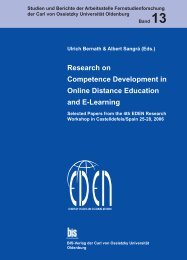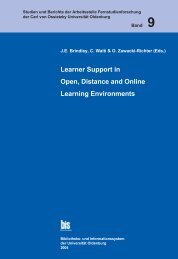Distance Education in Transition - Master of Distance Education ...
Distance Education in Transition - Master of Distance Education ...
Distance Education in Transition - Master of Distance Education ...
You also want an ePaper? Increase the reach of your titles
YUMPU automatically turns print PDFs into web optimized ePapers that Google loves.
The Pedagogical Flexibility <strong>of</strong> the Virtual University<br />
degree beyond the learn<strong>in</strong>g experiences which can be ga<strong>in</strong>ed at previous real learn<strong>in</strong>g<br />
locations.<br />
The feature which is most important and characteristic for our learn<strong>in</strong>g processes is that<br />
geographical distance no longer exists. As Nicolas Negroponte (1997) used to say:<br />
“<strong>Distance</strong> is dead!” However, not only constra<strong>in</strong>ts <strong>of</strong> distance, but also those <strong>of</strong> time<br />
and even reality are relaxed by <strong>in</strong>formation technology. Consider<strong>in</strong>g the remarkable<br />
new possibilities <strong>of</strong> such new virtual learn<strong>in</strong>g space we must ask ourselves whether<br />
� learn<strong>in</strong>g <strong>in</strong> virtual spaces can or should be the same as learn<strong>in</strong>g <strong>in</strong> real learn<strong>in</strong>g<br />
spaces, as many protagonists <strong>of</strong> net-based learn<strong>in</strong>g believe,<br />
� we are faced with a challenge to develop new pedagogical models for pursu<strong>in</strong>g<br />
university studies,<br />
� we should start plac<strong>in</strong>g much more emphasis on develop<strong>in</strong>g and empower<strong>in</strong>g<br />
autonomous learners.<br />
A. Prepar<strong>in</strong>g the Way to More Flexibility<br />
A critical analysis <strong>of</strong> those universities which <strong>of</strong>fer net-based courses soon shows that a<br />
real virtual university cannot yet be found anywhere <strong>in</strong> the world. This means that, for<br />
the time be<strong>in</strong>g, all we can do is describe the ways <strong>in</strong> which the net has been used for<br />
impart<strong>in</strong>g knowledge and skills <strong>in</strong> <strong>in</strong>stitutions <strong>of</strong> higher learn<strong>in</strong>g. In order to do this an<br />
unusual approach is taken. Four levels <strong>of</strong> activity are described: (1) pragmatic approaches<br />
by students, (2) pragmatic approaches by faculty members, (3) measures taken by<br />
<strong>in</strong>stitutions <strong>of</strong> higher education, and (4) theoretical <strong>in</strong>terpretations <strong>of</strong> these processes.<br />
Only the <strong>in</strong>tegration and further development <strong>of</strong> these four levels <strong>of</strong> activity will f<strong>in</strong>ally<br />
lead to real “virtual universities”.<br />
Pragmatic Approaches by Students<br />
An analysis <strong>of</strong> how students use their computers and the net for their own learn<strong>in</strong>g<br />
without any guidance or organisational provision by their faculty members or <strong>in</strong>stitutions<br />
is, pedagogically speak<strong>in</strong>g, <strong>in</strong>terest<strong>in</strong>g and reveal<strong>in</strong>g. Two journalists (Fliege & Härtel,<br />
2000, p. 54) <strong>in</strong>terviewed <strong>in</strong>dividual students and identified the follow<strong>in</strong>g activities:<br />
� carry<strong>in</strong>g out bibliographical research,<br />
� read<strong>in</strong>g notice-boards,<br />
� read<strong>in</strong>g extracts from books,<br />
� read<strong>in</strong>g pr<strong>of</strong>essional periodicals,<br />
� read<strong>in</strong>g newspapers,<br />
� contact<strong>in</strong>g the adm<strong>in</strong>istration by e-mail,<br />
� explor<strong>in</strong>g the respective labour market,<br />
� develop<strong>in</strong>g catalogues <strong>of</strong> books owned and used,<br />
� develop<strong>in</strong>g a network <strong>in</strong> evolution biology for young researchers,<br />
� develop<strong>in</strong>g the “service” “F<strong>in</strong>d and Br<strong>in</strong>g” which identifies relevant<br />
<strong>in</strong>formation and literature for the benefit <strong>of</strong> other students (commercially).<br />
179





